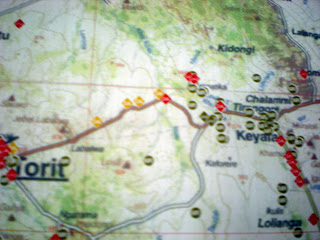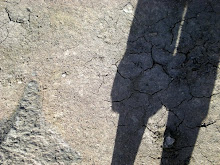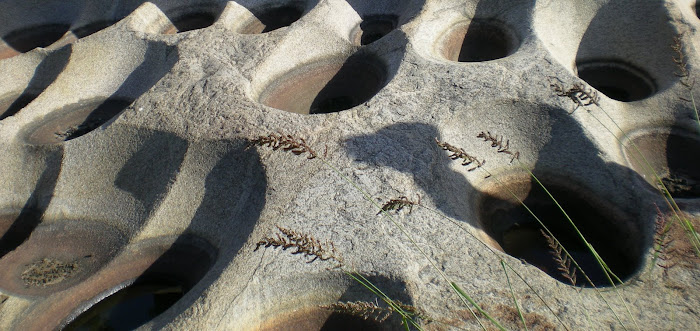
This morning we went to Keyala. Keyala is not that far from Torit-about a 45 minute drive.
This is the best picture I could get (its from a map, on a wall, in the Mr Olum's office.)
We went to the SSRRC office first. There were two Masaai men lounging out front with the police officers. The police were in blue camoflauge. The Masaai men were in draped checked cloth. (And I successfully spoke to them in Kiswahili. Yay me!)
We were getting a ride from Father Andrew, who is currently working with Shelter for Life. He is from Lafon (and he is one of the men taking me there on Tuesday). He has a round, smiling face, and was an excellent translator for us on this trip to Keyala. We all piled into the car. The drive down was spectacular, as usual. These huge mountains rose up against the sky so that it looked like you would drive right into them, and on the side of the road there were guinea fowl and termite mounds stretching right up to the sky in twisted oblong spikes. Ed made me hold the GPS out the window for a while and I kept accidentally slamming against the door, so that wasnt so fun (but seeing our progression on the GPS was pretty cool). In Torit (before we left) I had bought two hard boiled eggs from a boy on the street because he ever so nicely posed for a picture (and was generally adorable), but then both George and I couldnt bring ourselves to eat them (I hate hard boiled eggs, and George was petrified that he would get salmonella and die).
Anyway we finally rolled into Keyala with our convoy of UN land cruisers, covered trucks filled with food from WFP and a couple jeeps with SSRRC flags on them. We looked pretty impressive (even the soldiers at the checkpoint thought so-though they refused to awknowledge a wave or a smile). We parked next to a large grove of trees. The village is a large one, so we werent near the part that got burned. All the displaced people (and there were a lot) were huddled under the tree in the shade (let me tell you, it makes a huge difference temperature wise), milling about. There wasnt much they could do.
The center of town was circled around a large WWII era tank, over run with debris and children. We went to get a picture (George climbed up on it, to the delight of the small children) while I practised my Lotuka (with little success). The kids were completely entranced by us, which I suppose makes sense, although I felt a bit like a bleached giant and they all shly ran away from us.
We walked off to try and find some families to talk to about their use of nets and understanding about malaria. We brought one of the police officers with us to translate, since he was from Keyala. The first two families we talked to didnt use nets but awknowledged that mosquitos were pretty awful. Ed and the group wandered off, while I took a picture of the families, and then showed them the pictures on my camera. This took considerably longer than I had first expected, but it seemed to make them happy and we all spent a good long time smiling and laughing together before I wandered away. This happened everywhere I went. I would take a picture of someone, and then show it to them, and then everyone else near them would want a picture taken too. I had fun with these photoshoots-it was a great way to meet people and I was normally able to get by with some handgestures and broken Lotuko or Arabic.
We finally found a group who were able to answer a lot of our questions. It was really interesting to watch (Ed and the policeman were running it, George, Neesha and I were observing and chasing the ducks away from the buckets of sorghum). It was anthropology in action. The woman answered a lot of questions for us about malaria, pregnancy, health, etc. We asked her to write a song for us about the dangerous of malaria, and hopefully she will. We are going to go back and check at some point.
We oversaw a bit of distribution, and went and saw the grain mill-this big machine churning away under a tent. There was a machine with a whurring belt that ground up the grains, and then led it up and over into this giant sack. A man in a floppy hat, some women and a boy were in the tent, slowly feeding the ground flour into some round green containers. They were all dusted white, caked with sweat and flour. While Ed and Father Andrew investigated and talked to the workers, I went over and talked to a group of women sitting in the shade of a tin roofed verandah. I took their pictures and they laughed (although, I've noticed, that the second I go to take the picture, people stop smiling. Its as if they want to look as serious as possible-and they do. But i want some pictures of their smiles. THe sudenese people have wonderful smiles).
An ancient woman came up to me and grasped my hands in hers. She was swaddled in a dress, and she spoke in sharp, stuccato bursts, waving one hand in emphasis while clutching my other hand in hers. She demonstrated the ache she had been feeling in her bones, for two days she mimed, and seemed to think I could fix it, or at the very least diagnose it. Feeling utterly inadaquate, I asked the soldier to reccomend that she go to the clinic, because I wanted her to feel better (to which she responded, very clearly in any language "BAH" and wandered off).
A woman gestured to a small baby, naked except for strings of beads roped around his waist and wrist, and showed me the spots that had errupted all over his face and chest, spots the color of his pale palms. It was some kind of skin disease, but there was nothing I could do except nod sympathetically and let the baby clutch my finger. The women were all very animated, and we managed to have an entire conversation using very little except gestures and broken words, but i liked talking to them. It was relaxed. Though I know i probably should have been listening about how the grain mill worked, I liked seeing the babies, the little girls in their billowy dresses, the women resting in the shade.
We wandered back to the distribution point, and climbed up onto the roof of the tank to attempt to get cell phone service (yes. really.) We didnt get any (you cant really, outside of Torit) but it was fun regardless, and everyone in sight stared at us, clearly thinking we were crazy white people. Its a look I"m getting use to.
Ed wandered over to find other tall places to perch on, I found a solar panel and took a picture of it, and then I accidentally ran into the Commissioner, who I chatted with. He asked us to take some "publicity photos" of the cattle-once stolen and now being returned to their owners. It was just another step to rebuild the village. We hopped back in the car and drove down quite possibly the bumpiest, most rutted out road I have ever seen in my life. The jolts of the car were so intense that I was literally being thrown into the window at full speed and jamming my shoulder.
We got to where the cows were. They had been divided into two groups; one from one town, one from the other. I set about taking photos of them, trying to get distinct markings but really just keeping out of the way of their hooves, as they were panicked and not too smart. Ed, being much more savvy about cattle, took pictures of their ears. They came out really well, and the comissioner seemed happy. He wouldnt let us go to see the burned huts however, so we got back in the car and headed back to the center of the village.
The little kids at this point (traveling in a pack) set upon me because they saw my camera. I took photos of them, and after each photo I would show it to them. Apparently this was so exciting that they began to jostle and shove each other, and in the end, I kind of accidentally started a riot. You can see the photos online. From my perspective, stuck in the middle of this swirling group of screaming, gleeful, pushing shoving children, the photos are nothing but faces, grinning. From outside, all you can see is my torso. The rest of the photo is overrun with children. I really enjoyed myself, but i could tell the adults were worried they would trample me, and each other.
There were evident signs of poverty and bad health everywhere. A little girl with a hernia on her belly button had a baby with bumps and spots on its face slung on her back. A man with no nose was shaking people's hands. A child with weeping eyes, a runny nose and flies worrying about his face peered shly at me from behind a tin barrel. An old woman, her hands gnarled and scarred, a long pipe sticking out of the corner of her mouth, came and gripped my hands, her skin rough and bumpy, her eyes practically closed into slits.
It was heartbreaking. I felt useless there, like just another of the lines of khawajas that came to these villages, surveyed the status and situation of life, and left, making promises. I couldnt cure the child's skin condition, or the old womans chest pains. There was nothing I could do for the children who could barely open their eyes from the crud around their eyelids. The hundreds of people under the tree were homeless, and I couldnt fix that. I was impressed by the general air of contentness I found in the homes that we visited, but under the tree, the moods were as dark as the shade itself. They wont have homes before the rainy season. They wont have food of their own, or cooking utensils, or protection from the elements. What was distributed is wonderful, but it is the absolute basics that one needs to survive: plastic sheeting, some pots, some sorghum. I cant imagine what it will be like for entire families to huddle under a plastic sheet while the rains pour down, creating rivers where there were none before. They have no security, and for all that we distributed and probed and looked, we couldnt give them any.
Sudan is making me question things. I knew it would. I dont question my faith (i dont have any), but i do question my attitudes about modernity, development, help. Sometimes, like in Keyala, my very skin color feels like a lie. A promise that I cant keep. My whiteness (which I tried so hard to tan to brown) makes a presentation of wealth, power, influence, knowledge. It speaks for me and makes claims to power I dont have, before I even open my mouth. Next to it, in response to it, I disappoint. Its not easy.
People keep telling me they want to come to America, and I dont know what to say in response. I want to tell them. Next to the coldness of America, this feels friendly, warm, rich in culture and family and laughter, even if it is rich in poverty as well.



3 comments:
this was an interesting post. your insights and reflections are wonderful. it must be hard being there and being able to do so little.
<3
I am impressed with your willingness to learn different languages, and pleased that you find ways to communicate with people even though you only know a few words. In many ways, just being there and caring and being interested is in itself a blessing to those displaced people, and witnessing and communicating to us readers is something. Just raising the consciousness of people who have never thought of these people and their situation is a step forward. All of those children in the photos look as if they are having a wonderful time-- and so do you!
i could not be happier that you are there. i envy what you're seeing and, more importantly, what you're feeling.
Post a Comment